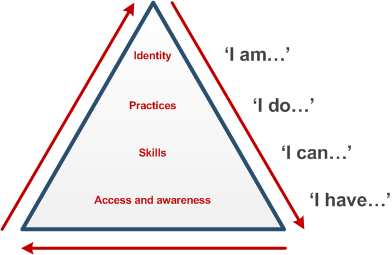The first
two weeks working on Topic 1: Online
participation and digital literacies have been very busy but interesting! I
have started to reflect on myself as an individual in this digital age and what
has characterized my journey so far.
In the
webinar on digital literacies on Tue 1 October with David White and Jörg Pareigis,
it was mentioned that if “people have well-functioning networks in place in the
real world, they may have little motivation for establishing online networks”. This
has characterized my journey in the digital age to some extent; I have doubted the
additional value I would gain professionally or personally from leaving a noticeable
digital footprint.
I found
David White’s videos on Visitors (Part 1)
and Visitors and Residents – Credibility (Part2)
(https://www.youtube.com/watch?v=sPOG3iThmRI&feature=youtu.be
https://www.youtube.com/watch?v=kO569eknM6U&feature=youtu.be)
as well as White and Le Cornu’s article Visitors and residents: A new typology for online engangement (White, D. & Le Cornu, A. (2011) Visitors and residents: A new typology for online engagement. First Monday, 16(9)., https://firstmonday.org/ojs/index.php/fm/article/view/3171/3049) helpful for locating myself on the continuum/ axes of visitor/ resident and personal/institutional. Up until now, I have mostly been using online tools for daily tasks (both personal and institutional) but on purpose not leaving too many traces of my online presence behind.
In his
video Visitors and Residents
mentioned above, White claims that “Residence forms of practice give us a whole
range of new ways that we can potentially engage as staff or students and our
users online. They have implications for our professional identities, for how
we produce and consume knowledge…”. This caught my attention in particular as it
challenged me to rethink whether and how I could potentially professionally (and
hmm…also personally?) benefit from using more of the residence modes.
As for my experiences of the ONL in general so far, I must say that I have been positively surprised by the ONL PBL collaboration online.  Initially I could easily relate to some parts of the first scenario:
Initially I could easily relate to some parts of the first scenario:
…”I guess that other participants will be more
experienced than me and I feel stupid asking about things. We are asked to
create a Learning blog on the web; it feels a bit scary to do this… I want to
keep my private life separate from my professional life.”
However,
with the first two weeks behind us and Topic 1 collaboratively completed, I am
feeling positive about asking those stupid questions since most of us in our
PBL group ask them anyways. It has been nice to see how quickly this process of
accessing, filtering and critically evaluating information as well as
connecting with individuals/ our PBL group via Zoom and adapting the
information found for learning and sharing with others became ‘normal’. I have
learned much from my group members’ skills, attitudes and behaviors already
now. What might have taken much longer with my perfectionism was completed
faster in this collaborative manner (as well as covering many more aspects than
I would have covered on my own).
This type
of working is nicely illustrated in Beetham and Sharpe’s ‘pyramid model’ of
digital literacy development model, which
also allows us to understand how individuals can be motivated to try new technologies and gain new skills by challenges at the higher level of the pyramid, for example when their sense of professional or academic identity is challenged or when the practices of their subject area change, or when new opportunities present themselves (http://web.archive.org/web/20141011224212/http://jiscdesignstudio.pbworks.com/w/page/46740204/Digital%20literacy%20framework).

Beetham and Sharpe ‘pyramid model’
of digital literacy development model (2010)
In
particular, I appreciate the life-long learning aspect of this pyramid model. Just
as digital literacies change, so should we to some extent. So, thank you, ONL and PBL02ers, for enabling
and sharing a bit of this journey with me!